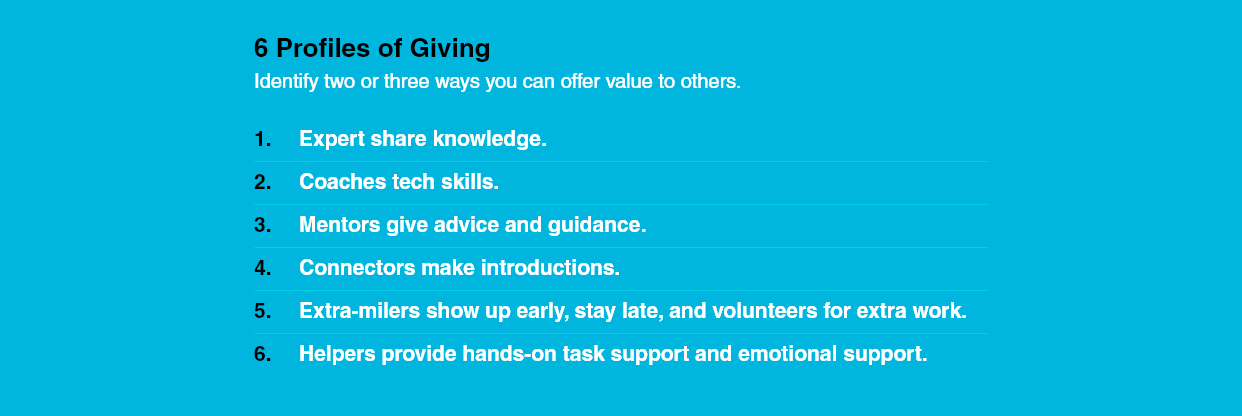NETWORKING PART IV: How to Become a Valuable Network Member
When giving back to a network, also try to have a plan.
The best way to learn to enjoy networking is to not think of it as transactional. Instead, focus on observing and reflecting on your interactions – learning about others’ experiences, celebrating their victories, appreciating their back stories. Over time, this approach will help you connect with different types of people, making your network more interesting, robust, and valuable.
Efficient = Effective
Harvard Business Review outlines six profiles of giving through which individuals can offer value to others. I found the framework useful in identifying the ways in which I prefer to give back to a network.

I prefer working as a Connector, Mentor and Expert, in that order. When a networking opportunity falls into one of those categories, it is easy and natural for me to act on it. By prioritizing these types of interactions, networking becomes less onerous and more joyful.
Offer Value
When someone reaches out to you for help, give specific feedback or information. The most disheartening and frustrating response is when someone says, “I don’t know” and simply moves on. It’s okay that they don’t know but what might be a better response is something like, “perhaps you can start here” or “Have you considered xx resource?” By even offering an alternative, the other party understands that you’ve made an effort and that you care about them. Making someone feel important by taking just a split second more and offering a considered responses goes quite far in building your reputation as someone worth knowing.
When offering feedback or advice, strive to make the other person better, not just show off your own knowledge or connections. Related, reach out when you think you can help, even if there’s nothing “in it” for you immediately.
Finally, active reading and observation will enable you to reach back into your network to nurture it by sharing information or connecting ideas.
Be Generous
People crave to be remembered and recognized – it’s just human nature. Whenever you connect with someone, try to remember something unique about them. And then, next time you connect, be sure to ask about that thing. For example, I try to remember the name of my contacts’ children or where they have a vacation home. When I jump on a call or drop an email, I’ll make sure to inquire about the kids or ask if they have plans to visit their weekend getaway. With younger people, I make it a point to ask how their experience at XYZ college is going or whether their first job at ABC firm was all they had expected.
Hoarding information is a sign of insecurity. While no one expects you give up trade secrets or intellectual property, be generous in your sharing of insights or information. If some bit of advice or information is exceptionally valuable, strategically share it (e.g., with certain people or on discrete platforms or at a specific point in time). And never mislead or lie to anyone. It’s just not worth the reputational risk.

Ayush and I grabbing a food truck lunch during his summer internship in San Francisco

Ayush at his graduation from MIT
Skills
Even a seasoned professional needs to develop skills to evolve into a helpful mentor or network member.
1. 1. Model good behavior. If you expect respect, show that as well. Don’t treat others poorly or blow off appointments. Value their time as they value others. If I’ve asked for advice or help, I try to act on it immediately and give feedback or updates to the person who offered it. That way I’ve given a signal that I am worth the investment of their time.
Similarly, before heading off to college, one of my advisees Ayush Sharma, asked me for advice on how to make the most of a US university education. While that is a broad topic with many nuances, I suggested that he set up a LinkedIn (LI) profile so that he could systematically document and organize the network he would soon enter. Within three hours of my making this suggestion, his LI profile was live and he had sent out 20 connection requests. Even this small action on his part gave me reassurance that he was worth my time and that he too would be a good mentor in the future.
2. Ask questions versus just talking. I have found that the receiving party will often reach his/her own conclusion about their dilemma in the course of answering your questions.
3. Listen to what is said. But, more importantly, listen to what is not said. Whenever I listen “between the lines” I am able to uncover insecurities, doubts, or concerns that the other party doesn’t explicitly recognize or that they are too shy to surface. Once when I was speaking with a recent MBA graduate, I sensed an uneasiness in her mannerisms and hesitation in her responses. When I probed a bit further, she confided that she had recently gone through a divorce and was feeling apprehensive about her recent move to a new city and new job. With that newly uncovered information, I was able to better guide her through her requests.
4. Always get permission before making introductions. For varying reasons, not everyone wants their email address or mobile numbers shared widely. So, before you connect two people, make sure that they are both okay with a mutual introduction and check what platform or format they prefer.
Conclusion
Networking can become an integral part of your life if you learn to identify the ways in which you thrive and enjoy the process. Step back, take stock, and lay out your networking plan and then start acting on it. Over time, you will tweak it and get into a groove that benefits you, and others in your network, for years to come!